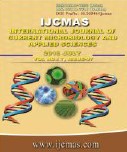


 National Academy of Agricultural Sciences (NAAS)
National Academy of Agricultural Sciences (NAAS)

|
PRINT ISSN : 2319-7692
Online ISSN : 2319-7706 Issues : 12 per year Publisher : Excellent Publishers Email : editorijcmas@gmail.com / submit@ijcmas.com Editor-in-chief: Dr.M.Prakash Index Copernicus ICV 2018: 95.39 NAAS RATING 2020: 5.38 |
Living in an era of globalization where tremendous increase in population is of a major concern. Land and water is a limited resource and hence proper management should be done to obtain optimum benefit from it. Chemigation is the combined application of chemicals along with irrigation water to the soil or plant surface. Application of various pesticides in the form of herbicides, insecticides, nematicides, rodenticides and plant growth regulators can be done with the aid of chemigation which lead to uniform application and better efficacy which in turn minimizes the excess deposition of chemicals in the environment. As compared to conventional broadcast application fertigation is more effective as it increases the NUE, productivity and quality of the crop thus preventing leaching loss of the nutrients. Pesticides applied through chemigation in the form of imidacloprid increase crop yield and minimize chemical leaching. Application of different herbicides through sprinkler resulted in high FUE and prevents contamination of groundwater. Drip chemigation of carbamates and organophosphates resulted in mixed insect control efficacy. As compared to foliar spray application of different fungicides chemigation was effective for soil borne pathogens. Chemigation with plant growth regulators affect plant growth and development by regulating nitrogen utilization and metabolic activities. A major advantage of chemigation is that it can be done through drip or trickle and it is cost effective as it does not require a vehicle to traverse and apply chemicals around the field. It saves the environment from different hazards as well as prevents contamination of the groundwater. Presently availability of labour is a major crisis and hence application on Internet on things (IOT) is on demand. A detailed knowledge of chemigation is required to support plant not only for supplying optimum quantity of nutrient but also protection from biotic process is also of utmost requirement.
 |
 |
 |
 |
 |